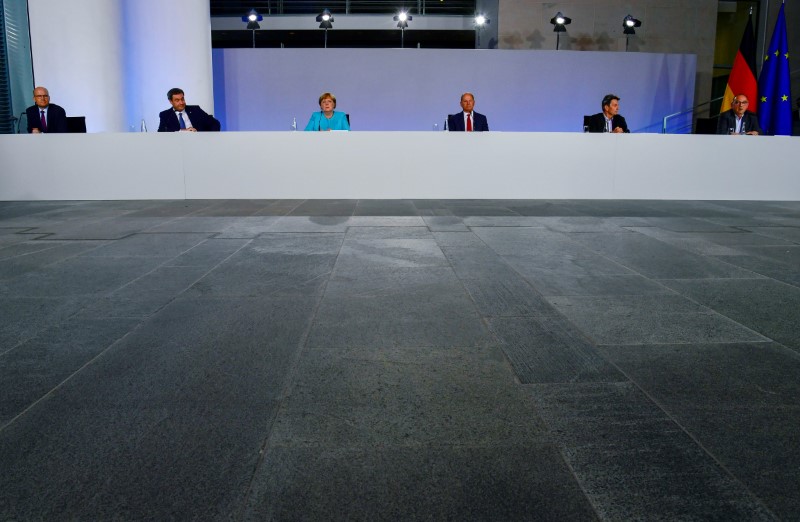By Michael Nienaber
BERLIN (Reuters) - Under pressure from its European peers for years to spend more, Germany has finally served up a bumper stimulus package financed with new debt, but Berlin's rediscovered love to splurge is causing fresh unease among its neighbours.
Chancellor Angela Merkel's ruling coalition presented stimulus measures worth 130 billion euros ($146 billion) late on Wednesday to speed up the recovery of Europe's largest economy from the coronavirus pandemic.
The package, which follows a 750-billion-euro rescue package agreed in March, includes a temporary cut in value-added tax, cash handouts for parents, more funds for small firms and bigger incentives to buy electric cars.
The package of extra spending and tax cuts is equivalent to roughly 4% of Germany's expected economic output in 2020, increasing its overall discretionary national fiscal push to 14%. Together with liquidity aid and loan guarantees, Berlin's coronavirus response equals more than 30% of economic output.
The measures are expected to push up Germany's debt-to-GDP ratio from roughly 60% in 2019 to at least 75% in 2020, a leap in German borrowing not seen since a massive stimulus boost during the global financial crisis more than a decade ago.
"The package shows once again that Germany is ready and able to spend when it matters," Berenberg economist Holger Schmieding said.
As Germany's measures go substantially beyond any other national emergency programmes from euro zone peers, the sheer scale of its new spending splurge has raised concerns that the discrepancy in aid could increase imbalances in the European Union and distort the bloc's single market.
Germany alone accounts for just under half of the emergency coronavirus state aid approved by the EU executive, adding to concerns that those countries with the deepest pockets might be getting an advantage.
"There is plenty of tensions about state aid being doled out by member states, in particular by Germany," a European diplomat said recently in the wake of the 9-billion-euro bailout for Germany's flagship carrier Lufthansa (DE:LHAG).
In Germany, this response evokes confusion.
"The criticism is a bit paradoxical and sometimes even disingenuous," a senior German government official said.
"Before the coronavirus crisis, we were the austerity Germans who were always spending too little. Now, we are the 'big spender' Germans who are trying to buy competitive advantages with their deep pockets."
German officials also say that other European countries will benefit from Berlin's stimulus push as strengthened domestic demand will automatically suck in more imports from French, Italian or Spanish producers.
In addition, Germany is generally backing plans for the European Commission to raise joint debt on an unprecedented scale of possibly up to 750 billion euros and use this money to prop up economies hammered by the coronavirus pandemic.
As part of this envisaged European Recovery Fund, the European Commission has adopted a solvency instrument to level the playing field among member states.
"This solvency instrument is shaped to support the private sector to invest in healthy companies who need liquidity or investment, so that we rebalance the unbalancing that has happened," a senior EU official said.
